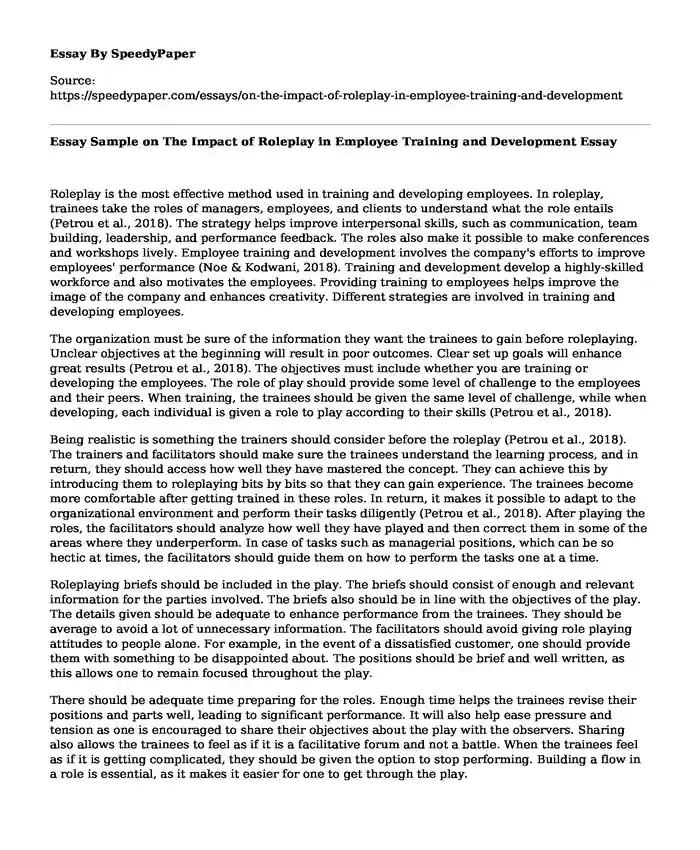
| Type of paper: | Essay |
| Categories: | Company Business Employment |
| Pages: | 3 |
| Wordcount: | 737 words |
Roleplay is the most effective method used in training and developing employees. In roleplay, trainees take the roles of managers, employees, and clients to understand what the role entails (Petrou et al., 2018). The strategy helps improve interpersonal skills, such as communication, team building, leadership, and performance feedback. The roles also make it possible to make conferences and workshops lively. Employee training and development involves the company's efforts to improve employees' performance (Noe & Kodwani, 2018). Training and development develop a highly-skilled workforce and also motivates the employees. Providing training to employees helps improve the image of the company and enhances creativity. Different strategies are involved in training and developing employees.
The organization must be sure of the information they want the trainees to gain before roleplaying. Unclear objectives at the beginning will result in poor outcomes. Clear set up goals will enhance great results (Petrou et al., 2018). The objectives must include whether you are training or developing the employees. The role of play should provide some level of challenge to the employees and their peers. When training, the trainees should be given the same level of challenge, while when developing, each individual is given a role to play according to their skills (Petrou et al., 2018).
Being realistic is something the trainers should consider before the roleplay (Petrou et al., 2018). The trainers and facilitators should make sure the trainees understand the learning process, and in return, they should access how well they have mastered the concept. They can achieve this by introducing them to roleplaying bits by bits so that they can gain experience. The trainees become more comfortable after getting trained in these roles. In return, it makes it possible to adapt to the organizational environment and perform their tasks diligently (Petrou et al., 2018). After playing the roles, the facilitators should analyze how well they have played and then correct them in some of the areas where they underperform. In case of tasks such as managerial positions, which can be so hectic at times, the facilitators should guide them on how to perform the tasks one at a time.
Roleplaying briefs should be included in the play. The briefs should consist of enough and relevant information for the parties involved. The briefs also should be in line with the objectives of the play. The details given should be adequate to enhance performance from the trainees. They should be average to avoid a lot of unnecessary information. The facilitators should avoid giving role playing attitudes to people alone. For example, in the event of a dissatisfied customer, one should provide them with something to be disappointed about. The positions should be brief and well written, as this allows one to remain focused throughout the play.
There should be adequate time preparing for the roles. Enough time helps the trainees revise their positions and parts well, leading to significant performance. It will also help ease pressure and tension as one is encouraged to share their objectives about the play with the observers. Sharing also allows the trainees to feel as if it is a facilitative forum and not a battle. When the trainees feel as if it is getting complicated, they should be given the option to stop performing. Building a flow in a role is essential, as it makes it easier for one to get through the play.
The observers should be allowed to share their comments after the role play. Their words play a significant role in the participants learning. The trainees should also benefit from other role players by figuring out what they did better than them. The feedbacks should not contain subjective comments as this lowers the morale of the trainees. To achieve a better role play, they should have clear goals and objectives. The feedback should be given immediately, and it should be specific, realistic, and measurable.
Roleplaying in an organization enables a trainee to assume tasks of a particular job. Doing this makes one experience real working conditions. Through roleplaying skills are enhanced and also help one develop competence for a specific position. In general, it leads to the development of an organization through a qualified workforce.
References
Petrou, P., Demerouti, E., & Schaufeli, W. B. (2018). Crafting the change: The role of employee job crafting behaviors for successful organizational change. Journal of Management, 44(5), 1766-1792.
Noe, R. A., & Kodwani, A. D. (2018). Employee training and development, 7e. McGraw-Hill Education.
Cite this page
Essay Sample on The Impact of Roleplay in Employee Training and Development. (2024, Jan 06). Retrieved from https://speedypaper.com/essays/on-the-impact-of-roleplay-in-employee-training-and-development
Request Removal
If you are the original author of this essay and no longer wish to have it published on the SpeedyPaper website, please click below to request its removal:
- Free Essay Sample on International Law
- Valeant's Secret Division - Business Ethics Essay Example
- Essay Example on Better Customer Service
- What is realism? Essay Example
- Free Essay Example. Trans-Border Security
- Paper Example. Conflict Between Turkey and the European Union
- Stress and Wellness - Annotated Bibliography Example
Popular categories




